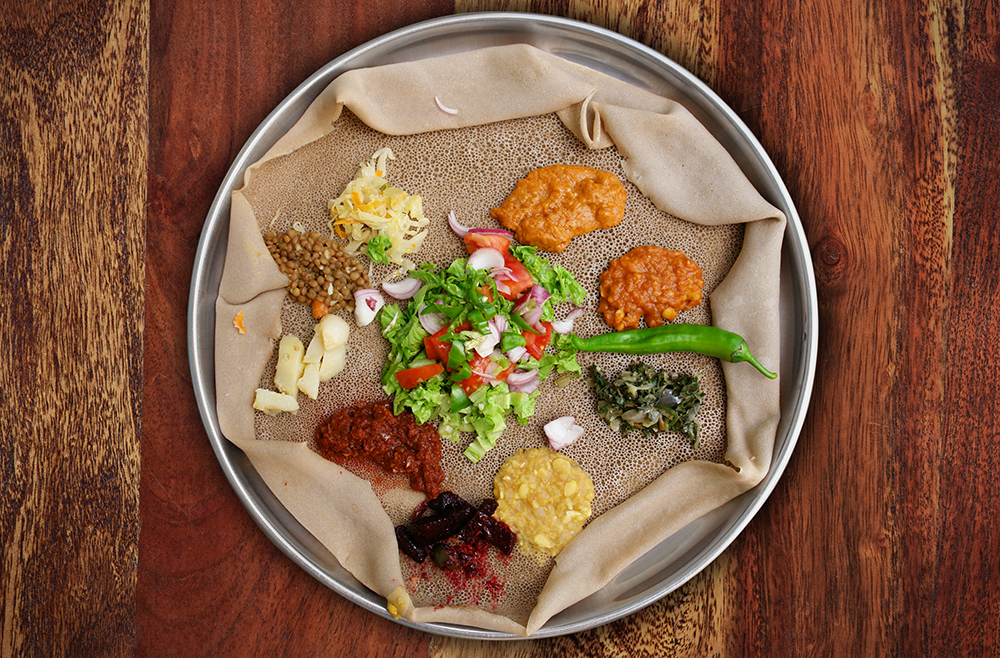Alex Rushmer packs his bags and heads to Ethiopia for a culinary adventure
I’ve recently returned from my boldest culinary experience to date. Six months ago I was alerted to a job advert for a guest chef position at an ecolodge in Ethiopia’s Semien Mountains National Park. I was, at that time, coming to the end of a consultancy job in the Swiss Alps and evidently hadn’t had quite enough of mountain living, so fired off a tentative application. A telephone interview quickly followed, then a meeting in Cambridge, and before I could think too hard about how much of an adventure it would be, dates were fixed and flights were booked.
“There’s no Internet here at the moment,” I was told in an email before I left, “but there is a cafe that has it about 80% of the time. That’s five kilometres away,” it continued. I briefed Charlotte, my wife, not to get too worried if she didn’t hear from me for several days at a time. A flight to Addis Ababa was followed by another to Gondar and then a slow, two-hour drive up the mountains to Limalimo Lodge, which sits right on the rim of an escarpment that feels very much like the edge of the world. This was to be my home for a month and, looking out from 3000m over the ancient landscape, it felt like a very long way from Cambridge.
Of course, the main reason for my journey was for the exchanging of culinary knowledge – in return for sharing my skills, recipes and kitchen management techniques, I would be immersed in a completely alien gastronomic tradition and be able to learn new techniques myself. I arrived midway through Lent which, given the power of the Ethiopian Orthodox church, is of major significance. Of the 180 mandated annual ‘fasting’ days – on which no meat or animal products may be consumed – Lent accounts for 55, so for almost two months prior to Easter Sunday a significant proportion of the country’s population is essentially vegan.
The staple food is a fermented, flat bread called injera made from either teff or barley flour stirred into a batter, left for 72 hours then cooked over a large shallow metal plate set over a fire. It serves as a communal edible plate for every meal and is both incredibly healthy and utterly delicious (although perhaps an acquired taste for some thanks to its distinctive sour tang).
‘It serves as a communal edible plate for every meal and is utterly delicious’
Various preparations of vegetables, lentils and salads are spooned onto the injera and then everyone helps themselves, using the fingers of the right hand to tear off pieces of bread which are then used to scoop up tasty mouthfuls of food. The national dish, and the food that sustains virtually everyone during the lengthy fast, is shiro wat, a thick soup made from onions, tomatoes and chickpea flour and flavoured with the nearly ubiquitous spice mix of berbere – a chilli-heavy spice blend that can contain up to 20 individual spices. Also popular, and more enjoyable, is mussir wat, a red lentil dish similar to dal but dark red and heady from the unmistakable hit of berbere.
As Easter rolled around there was a significant shift in diet. Everyone I worked with woke early on Easter Sunday with the enthusiasm of a child at Christmas. Chicken, lamb and beef were all squarely back on the menu and over the next few days I was lucky enough to be invited into several homes to taste some truly authentic Ethiopian home cooking.
Some, like dulet (a stew made from the tripe, kidneys and intestines of sheep) was somewhat challenging and left me longing for the veg-centric cooking of a few days previously. But others, like the rich chicken and egg dish doro wat, were memorably wonderful. And I will certainly be looking to recreate a spectacular preparation of slow-cooked lamb – so heavy with spice that it made my lips, already chapped from the altitude and dry air, tingle and burn in the most satisfying way.
Of course, there were things I missed: chewy sourdough, the familiar tang of an aged cheddar and a glass of Italian wine. But the experiences I enjoyed will linger longer in the memory than any of that does on the palate. Most of all though, I took away a reaffirmation that food has the power to transcend national, social, cultural and linguistic boundaries and bring people together more than anything else.

